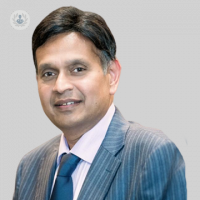Desiccated thyroid extract (DTE): a natural alternative to levothyroxine?
Written in association with:Desiccated thyroid extract (DTE) was widely used as a thyroid medication for centuries until the introduction of levothyroxine in the 90s, which has grown to become one of the world’s most commonly prescribed medicines. Recently, however, there’s been growing interest in natural thyroid extracts like DTE among patients with minor thyroid problems who aren’t benefiting from levothyroxine.
We asked Professor Parag Singhal, a leading endocrinologist with a specialist interest in thyroid diseases, to explain more about this medication and who is best suited to taking it.

What is desiccated thyroid extract (DTE)?
Desiccated thyroid extract (DTE), also known as natural desiccated thyroid (NDT), is a medication made from dried thyroid glands of animals, specifically pigs, and manufactured by different companies. It is a natural medication and not manufactured synthetically; instead, the thyroid of the animal has been dried and powdered into tablet form for medical use.
Who is best suited to taking DTE?
DTE is best suited to patients who continue to be symptomatic despite having normal TFTs (thyroid function tests) whilst taking levothyroxine. Out of all the patients taking levothyroxine, 5-10% continue to have persistent hypothyroidism symptoms despite normal thyroid functions. These patients typically benefit from changing from levothyroxine to this natural treatment. DTE contains the full spectrum of thyroid hormones, including T4, T3, and T2. T3 is especially important as it is responsible for bodily functions.
How do results compare to taking levothyroxine for hypothyroidism?
Most of the patients who are symptomatic despite taking levothyroxine that switch to DTE report feeling much better with a significant improvement to their symptoms.
It is important to note that there have been many trials carried out researching into the benefits of adding T3 to T4 with not very encouraging results, but there are certain patients who do benefit, especially those with deiodinase (D2) deficiency which impairs the ability to convert T4 to T3. T3 is, however, not available across most of the CCG’s and is very expensive in the UK on a private prescription, which makes natural thyroid a much cheaper option. I have over 150 patients who are currently on DTE and from my personal observation, 95% of those have noticed a significant improvement in their symptoms and quality of life.
Are there any disadvantages?
No. As long as your thyroid functions are within the normal limits and your functions are closely monitored and kept within the normal range, there shouldn’t experience any adverse side-effects.
What lifestyle changes can someone with hypothyroidism make?
While taking the right medication is essential to treat hypothyroidism, a sedentary lifestyle won’t help you to manage your symptoms. Ensure you are a healthy weight, eating a clean and healthy range of food with enough fruits and vegetables and regularly exercising.
Is DTE available on the NHS?
No, DTE is a personally licensed medication in the UK, so it is only prescribed privately.
If you are interested in this medication, visit Professor Parag Singhal’s Top Doctors profile and book an appointment to see him.


